Why does The Batman, Matthew Reeves’s incredible new marriage of comic book fantasy with Nolanesque sensibilities and a Burtonesque tinge, employ Schubert’s timeless “Ave Maria” so prominently? There are three key instances in the film, which I’ll describe below. The first is simply the opening. But why?
At first I thought Reeves used simply because it sounded cool and vaguely operatic, playing into the villain-likes-classical-music trope. Not unlike my use of that same tune in my The Dark Knight Rises fan trailer way back in 2011:
Yet on further analysis, this leitmotif is thematically justified and brilliant. To explain, I’ll have to go into the actual lyrics of the song, Catholicism, deep Batlore, Martha Wayne, mothers, THE Mother, and plot details.
(Which of course could mean spoilers).
First, let’s simply look at the translation of the lyrics, which Schubert got from Sir Walter Scott’s The Lady of The Lake. At this point in the epic poem, the heroine Ellen is praying to The Virgin Mary for help. And as we look at these words, it’s not the farthest thing to imagine them applying to Batman:
Ave Maria! maiden mild!
Listen to a maiden’s prayer!
Thou canst hear though from the wild;
Thou canst save amid despair.
Safe may we sleep beneath thy care,
Though banish’d, outcast and reviled –
Maiden! hear a maiden’s prayer;
Mother, hear a suppliant child!
Ave Maria!
Ave Maria! undefiled!
The flinty couch we now must share
Shall seem with down of eider piled,
If thy protection hover there.
The murky cavern’s heavy air
Shall breathe of balm if thou hast smiled;
Then, Maiden! hear a maiden’s prayer,
Mother, list a suppliant child!
Ave Maria!
Ave Maria! stainless styled.
Foul demons of the earth and air,
From this their wonted haunt exiled,
Shall flee before thy presence fair.
We bow us to our lot of care,
Beneath thy guidance reconciled;
Hear for a maid a maiden’s prayer,
And for a father hear a child!
Ave Maria!
It’s easy to see from even a cursory glance how some of the lyrics apply to The Dark Knight himself and the world he occupies.
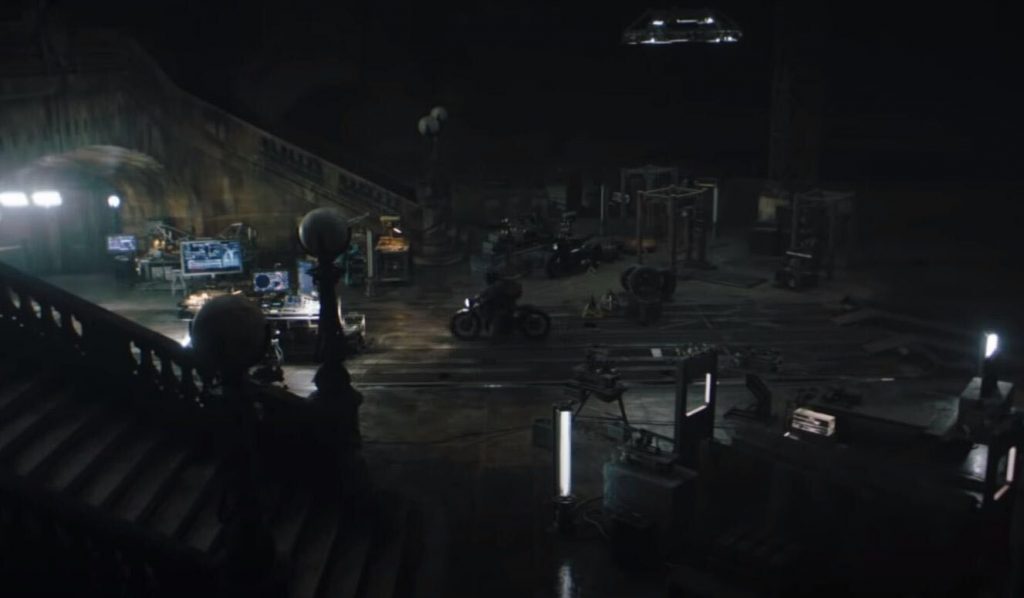
Shall breathe of balm if thou hast smiled
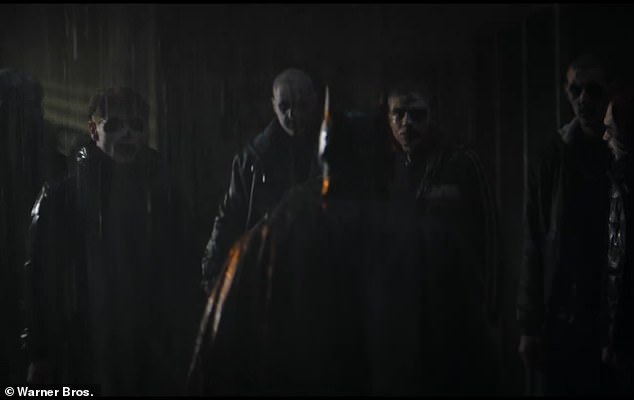
From this their wonted haunt exiled,
Shall flee before thy presence fair.
But deeper than that, what is this hymn about? Well, it’s clearly an appeal to Our Lady, which makes it de facto a Catholic prayer. But how does that apply to The Batman?
Is Batman Catholic? There’s a traditional debate about whether Bruce is a lapsed Episcopalian or lapsed Catholic. (http://www.comicbookreligion.com/?c=2&Batman_Bruce_Wayne)
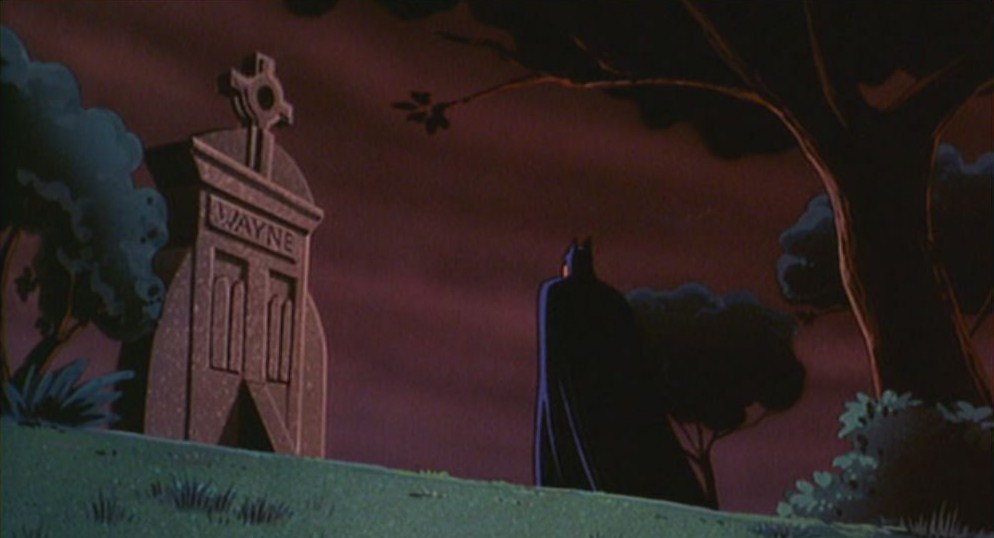
For my money, he’s too Gothic a character, too much brooding on cathedrals, to be coded as a nominally Protestant country club WASP.
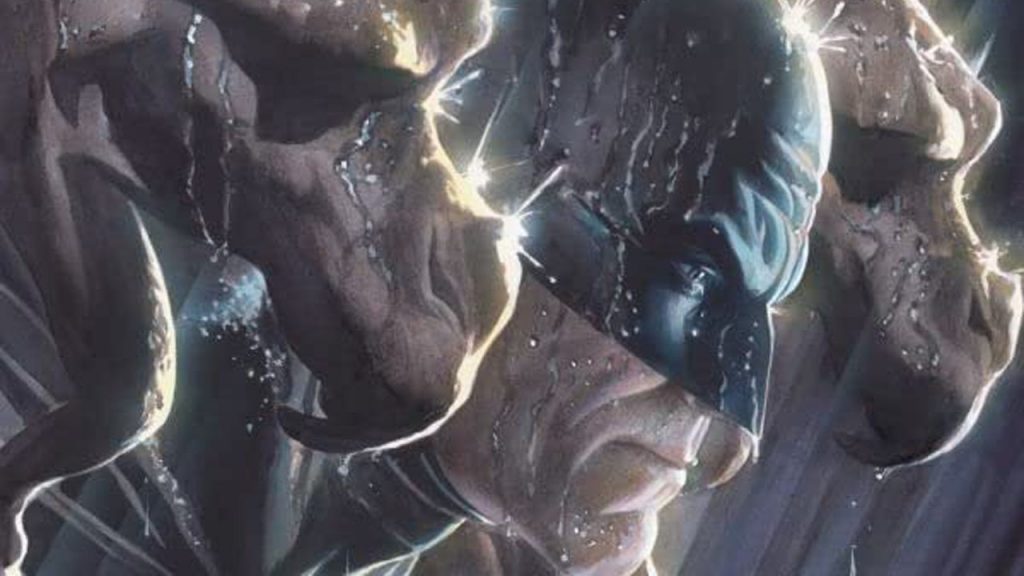
Certainly Huntress, originally his daughter before Helena Wayne became Helena Bertinelli, is explicitly Catholic. But it may be acclaimed Batman writer Chuck Dixon who put it best, most succinctly, “No Protestant ever suffered guilt the way Bruce does.”
And as for Bruce as the perpetually tortured orphan, crying out into the dark for a mother taken from him? Where do we begin to touch on the importance of Martha in the Batman mythos?
How about the significant, often maligned moment in Batman v Superman: Dawn of Justice, where Bruce finds a commonality with Clark in a climactic realization of their mothers.
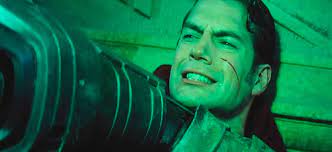
Then there is the iconic image of Martha’s pearls, in some canons a gift from young Bruce himself, falling onto the black pavement as innocence is shattered.
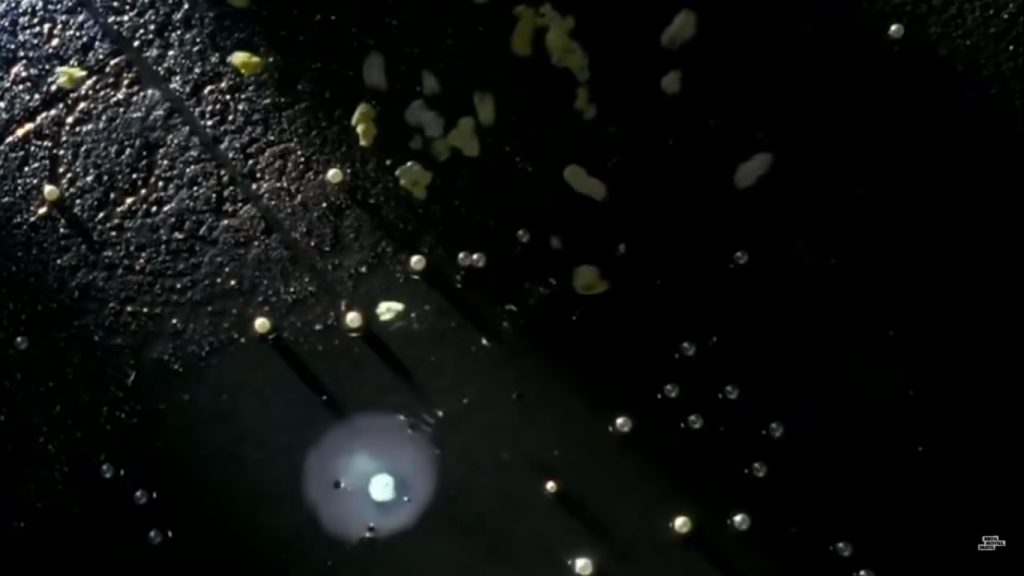
In Grant Morrison’s Arkham Asylum: A Serious House on Serious Earth, the single greatest Batman graphic novel ever written, both the Catholic themes (Morrison likens the fight against Killer Croc to St. Michael the Archangel vs Satan) as well as the importance of motherhood are clearly present. Amadeus Arkham’s mad mother’s suicide by pearl-handled razor was the original tragedy that damned the grounds on which he would build his hell of a hospital. As he fights The Dragon, Batman looks up to the statue of St. Michael and bemoans in his panicked state, “I cannot even pray. For I have no God.” It evokes the line, “If I had the time or the right, I would pray” from Frank Miller’s The Dark Knight Returns. This is not a refutation of the religious element, of course, but an acknowledgement of it. The Dark Knight yearns for the faith he lacks. After Batman finally emerges from this symbolic and cathartic nightmare, as Grant Morrison ends his novel with an epigraph from Lewis Carroll:
“And is not that a Mother’s gentle hand that undraws your curtains, and a Mother’s sweet voice that summons you to rise? To rise and forget, in the bright sunlight, the ugly dreams that frightened you so when all was dark“
While The Reverend Dodgson was Anglican and Morrison a Chaos Magician, the Catholic nature of this story resonates.
Martha and motherhood play a pivotal role in Whatever Happened to The Caped Crusader? by Neil Gaiman, which remains the “last” Batman story, as it is Martha who appears to her son at his end, guides him through this metatextual journey, and explains his fate.
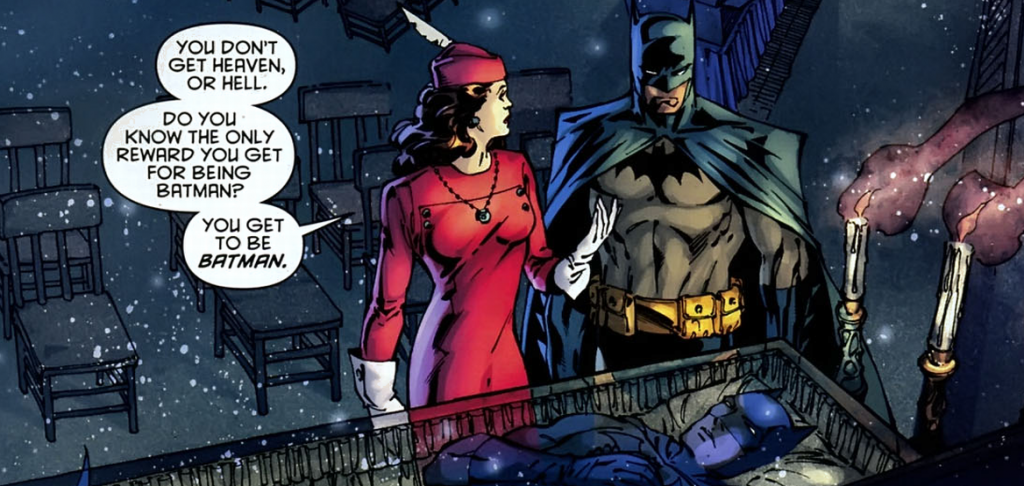
So how about this movie? Why this song? And why this theme?
The second use of Schubert comes during the funeral for one of The Riddler’s victims. Bruce attends and takes special note of the boy’s choir singing this hymn.
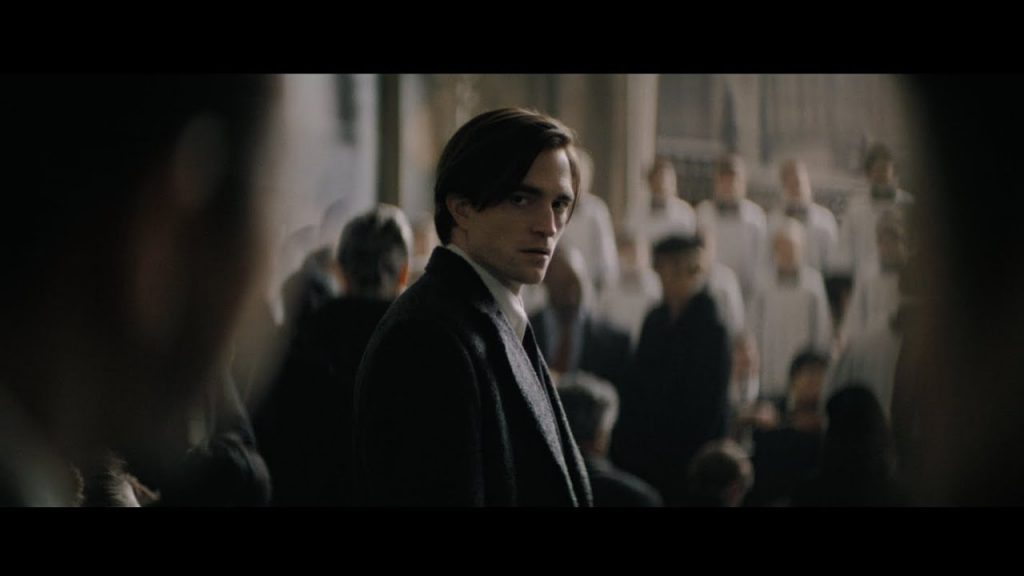
It’s clear enough why Batman stares so long at the son of a man just murdered- he sees himself in the boy. But what does the choir mean? Could it be that they too are orphans?
I would say so, as would the accompanying blog (https://www.classicfm.com/discover-music/periods-genres/film-tv/ave-maria-the-batman-soundtrack/), the author of which also notes a photo of another boys choir pinned on The Riddler’s manic board of crimes, clues, plans, and targets, next to a photo of Thomas Wayne and an article about the founding of the orphanage. I missed this detail my first time through, but I will definitely look for it next time I see the movie, and it bolsters my thesis.
The script doesn’t make it explicit it was a Catholic orphanage the Waynes founded, the one that Edward grew up in, and that for the corruption of The Wayne Foundation he would expose and avenge years later, the funds we misappropriated and thus the children neglected, 30 to a room and every winter at least one would die. Just as it doesn’t come out and tell us that Edward himself sang in that choir. Yet these are reasonable assumptions based on what we see and the larger thematic interpretation. The Catholic Church has a long history of orphanages (see Father Flanagan and Boys Town, for example, where my own grandpappy spent a time at) and it was hardly a secular song the choir sings, and Edward does too in his one interaction with Batman.
To go on, I’ll need to emphasize that I do believe that The Riddler, the most brilliant mind in the movie, did uncover Bruce’s secret identity. There is a degree of ambiguity here, but the face value explanation, that he considers Batman a kindred spirit on the same mission and that Bruce Wayne is nothing more than “the one who got away”, just doesn’t wash with me, and it’s much less satisfying. Why would he say Bruce Wayne’s name again and again to Batman, in so taunting a tone? Why would he articulate his animus in such detail?
And why would he sing Ava Maria?
The film tells us a key fact of its Martha Wayne, that she had a history of mental illness and spent time in Arkham Asylum. There is a direct line from Martha’s illness to everything in the plot, from Batman’s origins to The Riddler’s entire plan. Her time in the asylum was considered an embarrassing secret, one the reporter Elliott threatened to expose in the middle of Thomas Wayne’s mayoral campaign, leading to him asking Carmine Falcone to lean on him. Falcone took it too far, had Elliott killed, and when the otherwise upright Thomas threatens to turn him in for that, Falcone has the Waynes killed, which then allows him to take control of The Wayne Foundation and the whole cesspool of Gotham, including the subpar orphanage Edward grew up in, resenting that the boy billionaire got all the attention while he and the less fortunate orphans wallowed in poverty. Singing the choir’s signature song at Bruce is a succinct way to taunt him, remind him of his family’s failings.
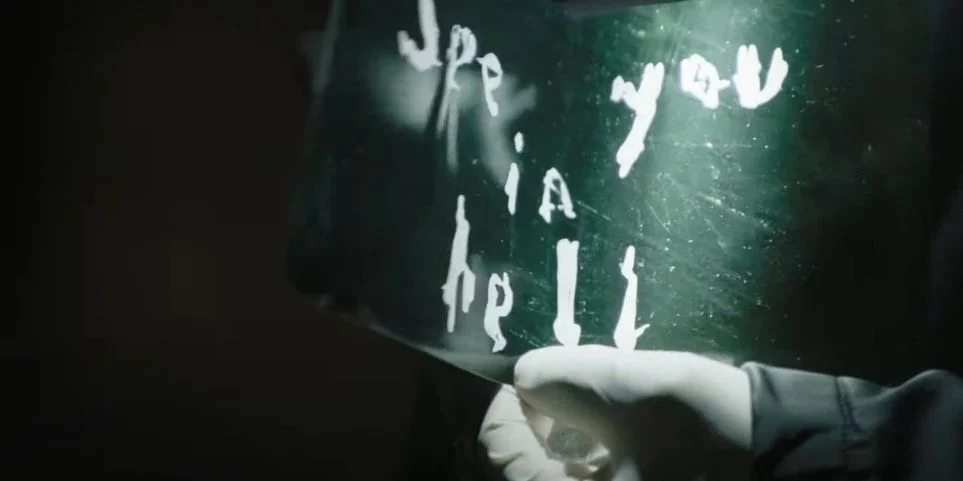
Morrison and Reeves get what Nolan, for all his talent, did not, that Batman is most effectively a mythic figure, and even if not coded Catholic, the mystical tinge, that he is literally a spirit of the night, The Bat Amadeus’s mother feared, Pattison’s Batman saying “I’m not hiding in the shadows. I am the shadow”, gives this take a fantastical gravitas Nolan’s “realism” lacked.
This film is remarkable among Batman movies, among superhero films in general, in that Batman does not actually defeat the villain. The Riddler bests him at every turn, even uses him to commit one of his murders. Any disappointment he had at the end was not Batman’s doing.
But back to this song, and the crucial exchange in Arkham between the two Catholic boys whose childhood was stolen (a fate also befalling Ace in JLU episode “Epilogue”, the zenith of animated Batman) and who responded in very different ways. Hail Mary means a lot here. The best interpretation of The Riddler is a brilliant man who needs to prove he is the smartest man in the room (as he almost always is), and sets his sights on Batman, recognizing him as his only intellectual rival. He would be satisfied in besting Bruce at chess, but as Batman is a superhero, The Riddler must needs be a supervillain. Additionally, Riddler stories have him inclined towards redemption, such as the fantastic and touching Riddler Reformed arc.
In this movie, Edward does best Bruce, in all ways but one. While Batman beats up street thugs, The Riddler takes on, and bests, the corrupt powers that birthed them both. Edward does it without mercy for the innocent, while Bruce ultimately recognizes it’s not enough to be vengeance (as both he and The Riddler’s acolytes proclaim, appropriating that which is The Lord’s). He must inspire hope as well.
Either way, they both need a mother, the Earthly one taken from them, as well as the Heavenly one who would lead them to a Savior more real than Batman could ever aspire to be.
Masterpiece that A Serious House is, Grant Morrison erroneously attributes the Lewis Carrol quote to “Alice’s Adventures in Wonderland”. In fact, it’s from “An Easter Greeting to Every Child Who Loves Alice”, and I will finish with that letter’s ending, a message that applies to Bruce, to Edward, to all in the fallen city that is Gotham and is our Earth:
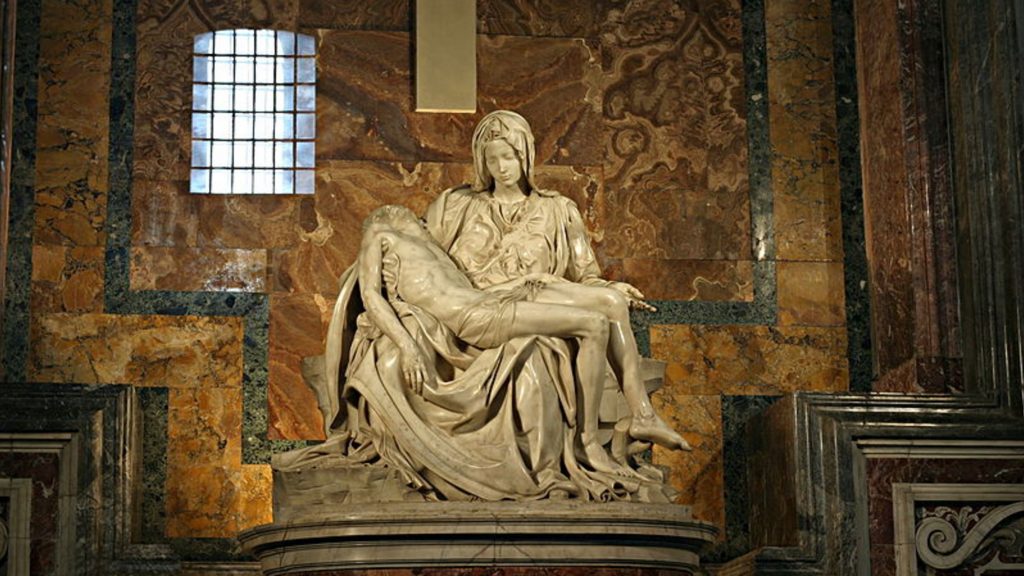
Surely your gladness need not be less for the thought that you will one day see a brighter dawn than this – when lovelier sights will meet your eyes than any waving trees or rippling waters – when angel-hands shall undraw your curtains, and sweeter tones than ever loving Mother breathed shall wake you to a new and glorious day – and when all the sadness, and the sin, that darkened life on this little earth, shall be forgotten like the dreams of a night that is past!